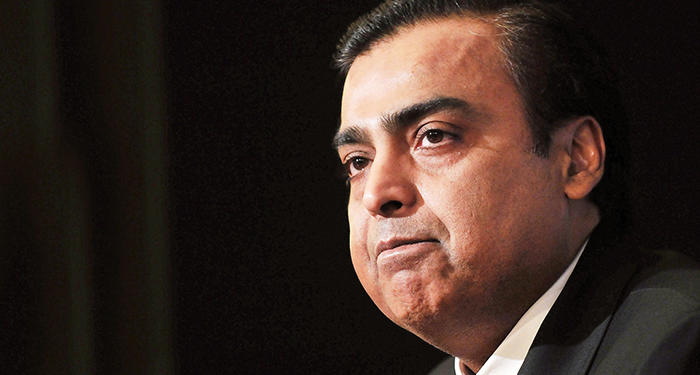In politics, with the current opposition keen to make a mountain out of a molehill, it is quite difficult to differentiate fact from fiction. The rumours are often lively and entertaining to the public and with authority like figures fueling the fire, narratives are more often than not, fabricated. One such myth is regarding Modi Government’s relations with Mukesh Ambani.
Often called ‘Ambani ki Sarkar’ by the Congress president Rahul Gandhi, Modi government has on more than one occasion been accused of favouring Reliance. Rahul Gandhi in his multiple speeches has been continuously pointing at this ‘relation’ and has instilled in the mind of the public that ever since PM Modi assumed office, everything in the country has been done to promote the interests of the Ambanis at the cost of the country’s poor. According to Rahul Gandhi’s interpretation, which he would like nothing more but to impose on others, the entire demonetisation scheme of the Modi government is only for the benefit of the big businessmen in the country. In almost every public rally that he addresses, he makes it a point to emphasise how the current government is ‘suit-boot ki sarkar’. These are, however, plain perceptions which couldn’t be further from the truth.
After the regime of the UPA government, which saw an unprecedented rise of crony capitalism, Modi government was the one to pull them back to an era of rule-based system. The government first began its sanctions on the Reliance Industries by imposing fines for under production of the natural gas in the Krishna-Godavari basin in Bay of Bengal. Apart from the fact that Reliance had shut down 10 drilling wells in 2013, they had been producing substantially lower gas than the required rate. While Reliance had attributed the shortfall in production to sand and salt water ingress, which led to low pressure during production, the ministry had said Reliance had not been producing and, was thereby, hoarding gas. Where the peak output is supposed to be 80 MMSCM per day, Reliance fields were only producing around 10 MMSCM per day of gas; which was leading to 20,000 MW of power generation capacity lying idle in the country for want of gas. In light of this, the Modi government had imposed fines on reliance for producing less than the targeted natural gas from eastern offshore KG-D6 fields. The fine imposed had run into thousands, first Rs 14000 crore and then additional Rs 2500 crore for under production.
Apart from this, a huge uproar had been caused when Reliance had migrated gas from the Andhra offshore block which belonged to an adjacent block under the state-run ONGC. A panel had been constituted by the ministry under retired Justice A P Shah to investigate into the state’s claims which directed reliance to pay fine to the government. “The committee has concluded that the contractor’s RIL- BP-Niko production of migrated gas and retention of ensuing benefits amounts to unjust enrichment, since the production sharing contract (PSC) does not permit a contractor to produce and sell migrated gas,” the committee concluded. A fine amounting to Rs 10311.76 crore had been imposed on Reliance for the same.
It is pertinent to note here that in spite of the fact that Reliance had been usurping ONGC’s gas since the 2009; yet the Manmohan Singh government, instead of imposing fines, had increased the gas price $8-8.4 against the then current price of $4.2 per million British thermal unit just few days before the UPA government was voted out in 2014. This move, just before the election was significantly aimed at benefitting Mukesh Ambani. This had led to wide protest and had even led the Delhi government filing a police complaint against the unprecedented increase in the prices.
Apart from the natural gas sector, Reliance telecom has also been under the radar during the Modi Government. Reliance Jio had been fined by the Telecom Regulatory Authority of India for slipping on various service quality benchmarks last year. A penalty of Rs 34 lakhs had been slapped on Mukesh Ambani on account of norms relating to Point of Interconnect congestion, accessibility of call centers or customer care, and percentage of calls answered by operators [voice to voice] in a set timeframe. The fines were party attributed to the new assessment methods TRAI had devised under the current government. The methods were to get a better insight into the dropped call rates and had asked the telecom operators to abide by its new quality of service benchmarks from October 1, 2017. Significantly, the new rules came along with a new graded penalty system in the range of Rs 1-5 lakh depending on the performance of a network, with stringent fines for repeat violations.
In striking contrast to the Modi government’s stance on the Ambanis, Manmohan Singh government had been constantly favoring the industrialists by bending the rules and implementing industrialist focused policies. It is said that loans worth Rs 36.5 lakh crore, granted to various corporates between 2005 and 2013, were waived off during the two successive terms of the Congress-led UPA government.
There are multiple instances indicating that the Modi government has been relentless in its crackdown on Ambani’s flouting of norms and regulations, which is in stark contrast to Manmohan Singh’s government. As head of BJP National Secretary Shrikant Sharma rightly stated, “Adani, Ambani and Mallya were not born in the past years…these are as old as the Congress party and have been flourishing when Rahul Gandhi was not even born. Therefore Congress owes more explanations about how these groups flourished if they had a tainted background.”



























